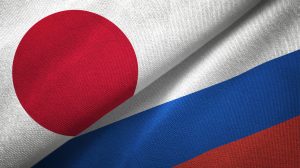Russia’s ongoing war in Ukraine has seriously damaged Russia-Japan relations as tensions between Russia and the G-7 countries – including Japan – have spilled over into the bilateral relationship. The most recent points of friction include Russia’s obstruction of the Treaty on the Non-Proliferation of Nuclear Weapons (NPT) Review Conference as well as continued diplomatic and military tensions in the Southern Kurils, which Japan claims as the Northern Territories.
There was much fanfare when Japanese Prime Minister Kishida Fumio laid out the ambitious Hiroshima Action Plan and delivered the keynote speech to the NPT Review Conference on August 1. Achieving a world without nuclear weapons is an important goal for Kishida – a goal he is so strongly committed to that he was willing to risk the political fallout of the conference ending in failure. Unfortunately, the pessimists turned out to be right in this case.
The conference ended inconclusively on August 26 without a final statement. Kishida placed the blame on Russia, which objected to any mention of its war in Ukraine. Kishida said, “It is extremely regrettable that a consensus (that signatories had worked to build) was not materialized due to opposition only from Russia.” While Kishida continued on to declare that “[m]aintaining and strengthening the NPT is the only realistic path to a world without nuclear arsenals as the treaty is the cornerstone for the global nuclear disarmament and nonproliferation,” this outcome is another severe blow for the NPT.
Much closer to the home islands, geographically, Russia unilaterally ordered an end to the visa-free travel program that allowed former residents of the Northern Territories to visit their old homes on September 3. The connection between this cancellation and Japan’s support for Ukraine was made very explicit: Leonid Slutsky, the chairman of the State Duma Committee on International Affairs, stated that the decision was in retaliation for Japan’s “illegal economic sanctions.” Russia, in addition to cancelling the visa-free program, has also suspended negotiations for a peace treaty with Japan.
Commenting on the state of bilateral affairs, Chief Cabinet Secretary Matsuon Hirokazu stated at a September 6 news conference, “All responsibility for the current state of Japan-Russia relations lies entirely with Russia.” Japan will lodge an official protest over the cancellation according to Foreign Minister Hayashi Yoshimasa.
Japan (as well as the United States) also protested to Russia over multinational military exercises being conducted on the two of the four disputed islands. The Vostok 2022 exercises started on September 1 and are scheduled to run until September 7. Japan’s Ministry of Defense spotted six Russian and Chinese warships firing machine guns into the Sea of Japan about 118 miles west of Cape Kamui on Hokkaido on Saturday. China’s Ministry of National Defense stated on Sunday that China had participated in air, ground, and naval exercises with the Russia Navy. The location and proximity of these drills, and the China-Russia collaboration it demonstrated, are of serious concern to Japan.
However, another possible takeaway is that the exercises – intended to demonstrate Russia’s “reserve strength” despite the ongoing war in Ukraine – in fact did the exact opposite. At Vostok 2018, the last time a large-scale military exercise was held in the Far East, 300,000 soldiers participated. This year, only 50,000 soldiers took part.
It is interesting to note that India – a Quad member – also participated in the land exercises, but declined to take part in the naval drills, reportedly out of respect for Japan’s concerns.
About a dozen other countries also participated in or observed the exercises, the largest number of foreign countries to take part in the Vostok military drills.































